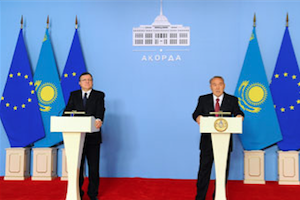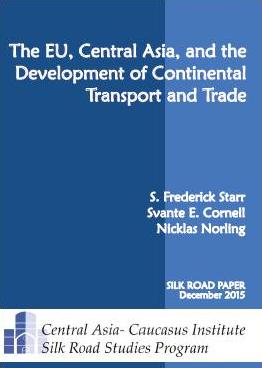Fourth Vector: Making Sense of Kazakhstan’s Activism in International Organizations
By Johan Engvall and Svante E. Cornell
ISDP Policy Brief no. 189, December 17, 2015
In the past two years, Kazakhstan has joined the World Trade Organization, obtained a seat at the Asia-Europe Meeting, signed an Enhanced Partnership and Cooperation Agreement with the European Union, announced it would host the EXPO-2017 in Astana, and launched a bid for a rotating seat at the United Nations Security Council. This extraordinary high frequency of international engagements is remarkable, but it represents a difference in degree and not nature in Kazakhstan’s diplomatic history. Indeed, since the fall of the Soviet Union Kazakhstan has developed a record of being the most proactive and innovative former Soviet republic in the sphere of international cooperation.
The EU and Kazakhstan: Developing a Partnership in Trade and Transport
by S. Frederick Starr and Svante E. Cornell
In 2015, the EU revised its Strategy for Central Asia, and finalized an Enhanced Partnership and Cooperation Agreement with Kazakhstan. These welcome steps will not turn the EU into a regional powerhouse overnight, but provide the EU with a platform to play a constructive role in Central Asia. The EU can achieve that if it avoids focusing on issues where it has little hope of direct influence, such as regional security affairs and domestic governance. Instead, to gain such a role eventually, the EU should focus on revitalizing the promise of its visionary initiative of the 1990s – the Transport Corridor linking Europe to Asia via the Caucasus and Central Asia – which it allowed to slip, handing the initiative to other powers, primarily China.
Kazakhstan and Europe: Charting a Path to Progress

Kazakhstan and Europe: Charting a Path to Progress
Tuesday, Dec. 14, 2015, from 1 to 5:30 p.m.
On December 21 in Astana, the EU and Kazakhstan are slated to sign an enhanced Partnership and Cooperation Agreement. This development of closer EU-Kazakhstan relations, in a year when Kazakhstan also joined the WTO, takes place as Kazakhstan's economic and security situation is at a crossroads. Kazakhstan's region harbors considerable uncertainty, while falling commodity prices have forced the government to adjust its priorities, and spurred fundamental economic reform. Meanwhile, Kazakhstan is planning to host the Expo 2017 in Astana, and is promoting a bid for the 2017 UN Security Council.
Conference program:
13.00 - 13.30 Welcome and Introductory Remarks
Dr. Svante Cornell, Director, Institute for Security and Development Policy (click for video)
H.E. Dr. Dastan Yeleukenov, Ambassador of Kazakhstan (click for video)
H.E. Mr. Stefan Gullgren, Head of the Department for Eastern Europe and Central Asia, Swedish Ministry for Foreign Affairs (click for video)
13.30-15.15 Panel one: Kazakhstan and International Politics
Kazakhstan 2050: Vision for a New Century
Dr. Dauren Aben, Nazarbayev University (click for video)
Nuclear Non-Proliferation
Tariq Rauf, SIPRI
Kazakhstan's Bid for the UNSC
Dr. Johan Engvall, Research Fellow at ISDP and the Swedish Institute of International Affairs (click for video)
Beyond Oil: Astana Expo 2017 and Green Energy
Dr. Nygmet Ibadildin, Associate Professor, KIMEP University (click for video)
15:15 – 15:45 Coffee Break
15:45 – 17:30 Panel Two: Europe and Kazakhstan
Kazakhstan and Europe: Toward a New Partnership
Dr. Michael Emerson, Centre for European Policy Studies (click for video)
Relations with Europe in Kazakhstan's Foreign Policy
Dr. Askar Nursha, Project Coordinator, Institute of World Economy and Politics (click for video)
Kazakhstan: An Island of Stability in a Turbulent Region?
Mr. Vladimir Socor, Senior Fellow, Jamestown Foundation (click for video)
Advancing Continental Transport: the EU and Kazakhstan
Dr. Svante Cornell, Director, Institute for Security and Development Policy (click for video)
Location:
Sheraton Stockholm Hotel
Tegelbacken 6
10123 Stockholm, Sweden




